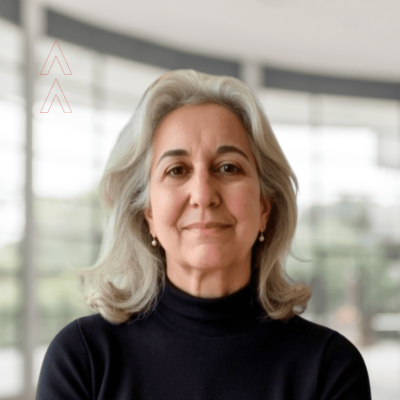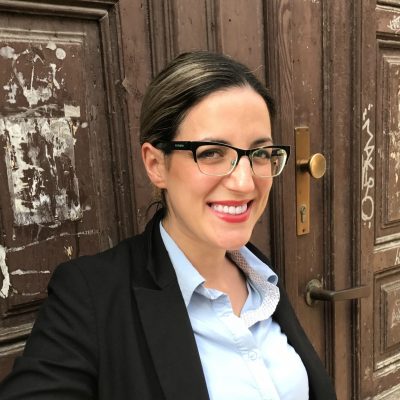Details
Article
Humanity in Action’s New Executive Director on Reform, Belonging, and Bold Leadership
Growing up between worlds
Azadeh (Azi) Khalili was raised in Iran by a Muslim and Jewish family—a dual identity that shaped her early awareness of resilience, empathy, and belonging. Having grown up under a dictatorship, she carries a profound commitment to strengthening democracy and advancing equity. Her lived experience has instilled in her a deep understanding of the importance of fostering pluralism, justice, and leadership.
As an immigrant woman who left her home in Iran as a teenager, “I was raised in a country where dissent was dangerous,” she says. “Where speaking out could mean exile, imprisonment, or worse. We watched lawyers shrink back from defending truth-tellers—not because they didn’t care, but because the cost was too high.”
“I was raised in a country where dissent was dangerous…You learn early how fear shapes the law, and silence becomes a form of survival.”
One of her heroes is Shirin Ebadi, the Nobel Peace Laureate and one of Iran’s first female judges. “She was stripped of her position for defending human rights,” Azi recalls. “Even in exile, she refused to stop advocating for justice. Her courage—and the threats she endured—was a window into what it means to hold fast to principle when the state sees justice as a threat.”
Those early lessons have never left her. “Based on my experience,” she says, “I know deep down that we can count on movements rooted in justice, dignity, and fierce love for one another. My speciality is bringing groups together to have difficult, courageous conversations that we’ve been trained to avoid—on issues like racial justice, gender, and class.”
A foundation in justice and public health
Azi began her career in public health, working on the frontlines of HIV prevention. As founder of the HIV/AIDS Technical Assistance Project, she partnered with the NYC Department of Education to reduce HIV transmission among young people—a program that became a national model, replicated in seven U.S. cities and in South Africa.
Earlier, she worked at The Fortune Society, a New York-based organization that supports successful reentry from incarceration. There, she provided advocacy and reentry services for justice-involved individuals and witnessed the challenges they faced as they rebuilt their lives.
A reformist at heart
Across a career that’s spanned government, philanthropy, and the nonprofit world, Azi has built a reputation as a reformer. “Time and time again, I’ve been brought in to reform systems from the inside,” she says. “Ensuring that the well-being of the most marginalized—those often considered ‘the last child’—is prioritized and uplifted, creating tangible and lasting results for all.”
“I always ask myself, ‘Is everyone’s well-being on the rise?”
That aim anchored her work under Mayor Michael Bloomberg, where she led efforts to reduce juvenile crime by revamping afterschool programming in neighborhoods with the highest arrest rates. Her team geo-mapped the city to identify programming gaps and filled them to keep teens safe, engaged, and off the streets.
Later, as Deputy Commissioner for the Mayor’s Office of Immigrant Affairs, she led a cross-agency planning initiative to improve services for the city’s 2.5 million immigrants—1.9 million of whom couldn’t speak English. “In 2008, we passed an executive order mandating language access at all city agencies that provide direct services,” she explains. “That policy changed how the city treated its immigrant communities.”
Advancing gender equity and economic justice
Under Mayor Bill de Blasio, Azi became the first Executive Director of the NYC Commission on Gender Equity, working across city agencies to ensure that all New Yorkers—regardless of gender identity or expression—could access safe, fair public services.
She also played a pivotal role in New York City’s groundbreaking support of worker-owned cooperatives. “Our research found that these businesses were often run by first-generation immigrants who faced wage theft and discrimination,” she says. “They had incredible ideas, but no capital or infrastructure. The city’s financial investment changed that. It was the largest of its kind in the country.”
Why Humanity in Action?
Returning to international work, especially leadership development, is a full-circle moment for Azi. “I’m so excited to support our 3,000 Senior Fellows and to deepen our community,” she says. She’s particularly energized by supporting Fellows’ Action Projects and building new fellowships.
Her vision is one of growth—and bravery. “I want our Fellows’ experiences to be powerful and timely enough to meet the moment. I want them to build muscle for discomfort so they can go out and do even bigger things.”
“I want our Fellows’ experiences to be powerful and timely enough to meet the moment.”
“And I want them to know that we’ll always have their backs. When they succeed, we’ll be there to celebrate every win. And when their efforts fall short, we’ll hold them—with care and without judgment—until they can stand up again. Because that’s what real community, trust, and solidarity look like.”




